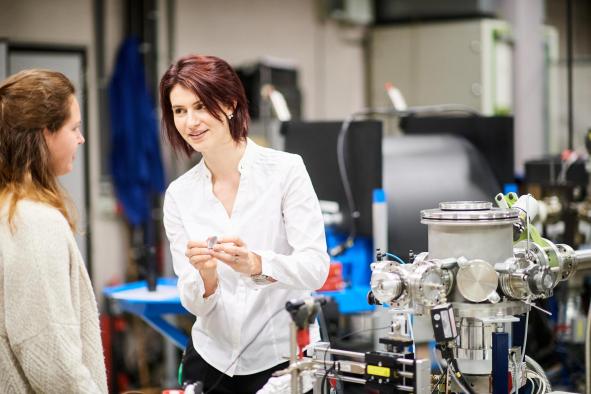Master in Physics, Professional focus in Physics and Data
-
Schedule
regular course
- ECTS Credits 120

Physics and data
Data are part of the everyday life of physicists. Whether they come from measurements or simulations, whether they are available in very large quantities or in small numbers, these "data" require the application of suitable methods to provide a maximum of useful information for scientists.
This goal proposes to complement physicists' excellent basic training in modeling and numerical methods by giving them the keys to develop specific tools for processing, visualizing and interpreting data.
Your objectives
- Acquire skills in data analysis, processing and visualization.
- Be able to meet the demands of research laboratories and industry for the manipulation of scientific data.
- Develop innovative solutions at the frontier of data science and physics.
The benefits of training
- A choice between specialization and broader training through elective courses, dissertation, personal work and internship.
- An opening up to society thanks to an internship - in Belgium or abroad - which enables you to fine-tune your training as a physicist and offers you the opportunity for numerous scientific and human encounters and experiences. Erasmus stays and visits to internationally renowned laboratories are also strongly encouraged.
- A broad training in the different fields of physics with specializations (lasers, new materials, environmental physics, life physics, data science and didactics) that offer a wealth of job opportunities directly after the master's degree.
- An ethical awareness: physicists' responsibility in building a fairer, more sustainable world.
Research and dissertation

Research in physics and data covers, among other things, the development of algorithms for the analysis and interpretation of spectroscopic data, the optimization of new materials based on numerical simulations and/or experimental data, the analysis of electron microscopy images.... For example, light extraction by LEDs has been optimized using genetic algorithms.
By classifying abstract data, machine learning enables intelligent decision-making based on automatic data analysis. It also makes it possible to propose novel materials based on the properties of existing solids.
Other master's degrees in physics
The University of Namur is organizing:
- the master 120 in physical sciences
- the master 60 in physical sciences
- the master in physics education
- 120 credits - section 4 (from 2025)
- 60 credits - section 5 (from 2025)
-
<unknown>
Code Name Staff Th.+Ex. Credits/Block 1 2 3 SPHYM136 Data acquisition and digital processing Deparis Olivier 30h th. + 15h ex. 4 SPHYM138 Scientific communication Lobet Michaël 15h th. 2 SPHYM231 Fundamental interactions Daubie Evelyne 30h th. 3 SCHIM223 Science and Energy Su Bao Lian Olivier Yoann 24h th. 3 SSPSM101 Science, ethics and development Leyens Stéphane Tilman Valérie 18h th. + 6h ex. 3 SPHYM101 Radiation-matter interaction Colaux Julien Lucas Stéphane Stasser Coraline 30h th. + 30h ex. 6 SPHYM106 Nanomaterials ans applications of solid state physics Henrard Luc Sporken Robert 45h th. + 15h ex. 6 SPHYM109 Laser physics, non-linear and quantum optics Lepere Muriel Caudano Yves Leonis Sylvain 45h th. + 15h ex. 6 SSPSM202 Philosophy of material sciences Sartenaer Olivier 12h th. 3 -
<unknown>
-
<unknown>
Code Name Staff Th.+Ex. Credits/Block 1 2 3 SPHYM122 Research project Louette Pierre 9 -
<unknown>
Code Name Staff Th.+Ex. Credits/Block 1 2 3 SELVM202_P33857 Refresher course in Dutch (level B1) Vanparys Johan Dobbelaere Katia 30h th. 3 Soft skillsSELVM201_P33760 Further training in English (level B2+) Zimmer Carole 30h th. 3 -
<unknown>
Code Name Staff Th.+Ex. Credits/Block 1 2 3 Soft skillsIDASM103 Visualisation of information Dumas Bruno Dumas Bruno 30h th. + 15h ex. 4 SPHYM151 Data Science in Physics MAYER Alexandre 15h th. + 10h ex. 3 SPHYM152 Programming for data science Mairesse Richard 10h th. + 10h ex. 2 IDASM102 Machine learning and data mining Frenay Benoît 30h th. + 15h ex. 6 SPHYM253 Internship Haye Emile 15 -
<unknown>
Code Name Staff Th.+Ex. Credits/Block 1 2 3 SPHYM205 Master thesis Louette Pierre 21
-
<unknown>
Code Name Staff Credits Hours/Quarter 1 2 SPHYM136 Data acquisition and digital processing Deparis Olivier 4 30h th. + 15h ex. SPHYM138 Scientific communication Lobet Michaël 2 15h th. SSPSM101 Science, ethics and development Leyens Stéphane Tilman Valérie 3 18h th. + 6h ex. SPHYM101 Radiation-matter interaction Colaux Julien Lucas Stéphane Stasser Coraline 6 30h th. + 30h ex. SPHYM106 Nanomaterials ans applications of solid state physics Henrard Luc Sporken Robert 6 45h th. + 15h ex. SPHYM109 Laser physics, non-linear and quantum optics Lepere Muriel Caudano Yves Leonis Sylvain 6 45h th. + 15h ex. -
<unknown>
-
<unknown>
Code Name Staff Credits Hours/Quarter 1 2 SPHYM122 Research project Louette Pierre 9 -
<unknown>
Code Name Staff Credits Hours/Quarter 1 2 Soft skillsIDASM103 Visualisation of information Dumas Bruno Dumas Bruno 4 30h th. + 15h ex. SPHYM151 Data Science in Physics MAYER Alexandre 3 15h th. + 10h ex. SPHYM152 Programming for data science Mairesse Richard 2 10h th. + 10h ex. IDASM102 Machine learning and data mining Frenay Benoît 6 30h th. + 15h ex.
-
<unknown>
Code Name Staff Credits Hours/Quarter 1 2 SPHYM231 Fundamental interactions Daubie Evelyne 3 30h th. SCHIM223 Science and Energy Su Bao Lian Olivier Yoann 3 24h th. SSPSM202 Philosophy of material sciences Sartenaer Olivier 3 12h th. -
<unknown>
-
<unknown>
Code Name Staff Credits Hours/Quarter 1 2 SELVM202_P33857 Refresher course in Dutch (level B1) Vanparys Johan Dobbelaere Katia 3 30h th. Soft skillsSELVM201_P33760 Further training in English (level B2+) Zimmer Carole 3 30h th. -
<unknown>
Code Name Staff Credits Hours/Quarter 1 2 SPHYM253 Internship Haye Emile 15 -
<unknown>
Code Name Staff Credits Hours/Quarter 1 2 SPHYM205 Master thesis Louette Pierre 21
Les métiers des physiciens
Physicists' professions
Various skills
Thanks to their general multidisciplinary training (physics, mathematics, computer science, physical chemistry, new materials...), physicists are offered a fairly wide range of careers: academic research, teaching, computer-related activities, development activities in industry and hospitals...
Tough and rigorous, with good analytical skills, excellent mathematical modeling abilities and a rich scientific culture, physicists contribute to the advancement of knowledge and the development of applications in the service of mankind.
All these high value-added skills make physicists valued professionals on the job market.
Pushing the limits of our knowledge
According to a survey of our alumni, more than half of young graduates start their professional lives with experience in scientific research, mainly in academia, in Belgium or abroad. Universities and public funds finance the completion of a PhD (usually 4 years) or grant scholarships for participation in a research program.
Other physicists pursue their investigative work at leading-edge research institutes in very specific fields (e.g. CENAERO, a center of excellence in aeronautics in Gosselies, CERN, the particle physics laboratory in Geneva, SCK-CEN, the center for the study of nuclear energy in Mol or the Royal Meteorological Institute).
Developing industrial applications
In industrial settings, physicists are also involved in the development of high-tech or highly specific products (e.g. glass treated to save energy, safer sheet metal for the automotive industry, cyclotrons for nuclear medicine, etc.). They are also found at the head of important responsibilities downstream from research and development, notably in production departments.
Informatics and telecommunications
A solid IT background makes physicists operational in IT service companies (consultancy) or in any type of user organization (bank, insurance company,
etc.). The telecommunications sector in particular calls on the expertise of physicists for their skills in optics, electronics or even information processing.
Transmitting a passion for reality
Among the activities open to physicists, teaching and the world of training in general remain very buoyant. Over 15% of our professionally active graduates communicate their passion for reality by teaching physics as well as science and mathematics in Haute École or upper secondary education.
Physics and medicine
In the hospital environment, physicists work alongside doctors: they take part in drawing up treatment plans for patients cared for by nuclear medicine; they ensure the quality control of various medical imaging equipment; they also contribute to the development of new analysis technologies.
Expert physicists
The administration calls on the expertise of physicists. They guide policies on energy, the environment, space, etc., for example by issuing opinions on research priorities.
Testimonials from former students
The research institute where I work is concerned with the composition of our atmosphere and air quality. We are developing analytical techniques for
continuous measurement of the concentration of a range of key atmospheric gases, using satellite and ground-based instruments. These activities are carried out in an international context, in collaboration with major European agencies such as ESA and EUMETSAT.Christophe - Institute of Space Aeronomy
Thanks to the work accomplished during my PhD thesis at UNamur and the encounters made, I am now a postdoctoral researcher at Lawrence Berkeley National Lab in California. My time is divided between laboratory work, analysis of results and writing articles or scientific projects. In the laboratory, the tasks to be accomplished are diverse and include both highly technical and highly specialized aspects, such as laser alignment, sample preparation and data acquisition. Analysis of results includes code development.
Frédéric - Lawrence Berkeley National Lab
At UNamur, I acquired a solid background in physics as well as a passion for optical phenomena present in living organisms, such as their staining. I am currently conducting
research into the fluorescence of beetles and butterflies. This research is interdisciplinary, enabling me to work not only with physicists, but also with biologists, chemists and engineers. The aim is to understand the influence of color on the behavior of living organisms, with a view to developing new technological applications inspired by nature.Sébastien - University of Exeter in the UK
After my thesis at UNamur, where I acquired solid multidisciplinary knowledge, I did a two-year postdoctorate at a marine biology institute in San Diego. Now I work as a corporate consultant, at all levels: market research, sales reorganization, purchasing, tender support.
Annick - H & Z